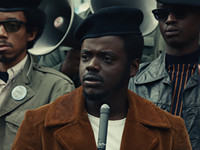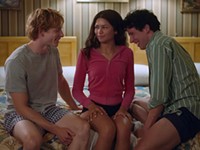[
{
"name": "500x250 Ad",
"insertPoint": "5",
"component": "15667920",
"parentWrapperClass": "",
"requiredCountToDisplay": "1"
}
]
"Ouija: Origin of Evil" isn't the type of movie that inspires much confidence of quality: the prequel to a critically reviled, low-budget horror movie (that'd be 2014's "Ouija") based on a Hasbro board game is not the most promising of pedigrees. But if there's ever definitive proof of how much a skilled director can bring to the right material, this is it.
Filmmaker Mike Flanagan ("Oculus" and the nifty home-invasion thriller, "Hush," which you can -- and should -- currently find streaming on Netflix) delivers a legitimately creepy horror flick that's dripping with wit, style, and imagination. With Halloween mere days away, "Ouija: Origin of Evil" makes for a fantastic way to get into the spirit of things.
The film is set in 1967 Los Angeles, where a widowed mother, Alice (Elizabeth Reaser), runs a medium business out of her suburban home, performing séances and offering mystical guidance to bereaved customers. Her two daughters, teenager Lina (Annalise Basso) and 9-year-old Doris (Lulu Wilson), give her behind-the-scenes assistance.
Early on, her youngest expresses some doubt over the ethics of their family business, but Alice is quick to reassure her daughter that they're not scamming innocent people. They're doing good, using their skills to offer their customers comfort and help them find some closure. Sometimes it just takes a little extra showmanship to help them accept things. Besides, Alice desperately needs the money to support the family.
When Lina suggests her mother liven up the act with a newfangled Ouija spirit board that's caught on with her friends, Alice decides to give it a go. But when trying out the new prop, she inadvertently taps into something truly supernatural and evil (the "Ouija" films remain an odd product tie-in -- these stories are unlikely to convince someone that bringing the game into their home is a smart idea). A malevolent spirit seems to grab a hold of Doris, and it doesn't seem intent on letting go without a fight.
Like James Wan with "The Conjuring," Flanagan doesn't seek to reinvent the genre with "Ouija: Origin of Evil," he seems more interested in giving audiences a sterling example of its possibilities. The amount of craft displayed in every frame of the film is a joy to discover -- the pleasure is truly in the details. The production design from Patricio M. Farrell and costumes by Lynn Falconer are spot on, and the film is filled with inventive period details, not just in the design and look of the film, but in its presentation as well.
The film opens with retro studio logos and an old-fashioned title card, complete with copyright date. Flanagan incorporates some De Palma-esque split diopter shots (where objects in both the extreme foreground and extreme background are simultaneously in focus), and even adds in "cigarette burns" to the corners of certain frames to signal the projectionist of a reel change (if there were still reels to change -- everything is projected digitally in multiplexes these days).
Unlike something like "Grindhouse," which employed similar vintage filmmaking techniques as winky parody, here those little touches never call attention to themselves. If you're not looking for them, they'd be easy to miss. But utilized this way, they add to the film's authenticity and immersive quality, and the soft, slight cinematography by Michael Fimognari completes the effect.
The performers are given real characters to play, thanks to a strong screenplay from Flanagan and Jeff Howard. All three of the lead actresses deliver empathetic performances, so we truly feel concern when terrible things start to happen to them. Lulu Wilson's performance is particularly impressive; she doesn't fall into the horror genre's typical "creepy children" problem, where in order to find a kid who can appear suitably creepy, filmmakers sometimes get stuck with one who's never quite convincing when asked to appear normal. Wilson's transformation from cherubic, sweet-natured little girl to instrument of death is completely convincing. And terrifying. Henry Thomas offers excellent support as Father Tom, the parochial school principal who takes an interest in the girls' well-being after he notices Doris's increasingly odd behavior.
Based on its trailer, I'd been worried about the amount of computer-generated effects used in the film. CGI is frequently a death knell for the fright potential in horror films: whatever tension has been built up almost always dissipates once directors decide they have to show their monsters, often through unconvincing CGI. Thankfully Flanagan chooses to use these effects sparingly, more often letting veteran creature actor Doug Jones portray the entities.
These less showy decisions are typical of Flanagan's directorial restraint. "Ouija: Origin of Evil" is relatively bloodless, even with its PG-13 rating, the film could clearly have gotten away with more if it wanted to. But Flanagan is extremely conscious of what he's showing us, choosing to leave most of the action to our imagination, trusting that our minds are capable of scaring us far more easily than pixels.
Check back on Friday for additional film coverage, including reviews of "Denial" and "Miss Hokusai."










